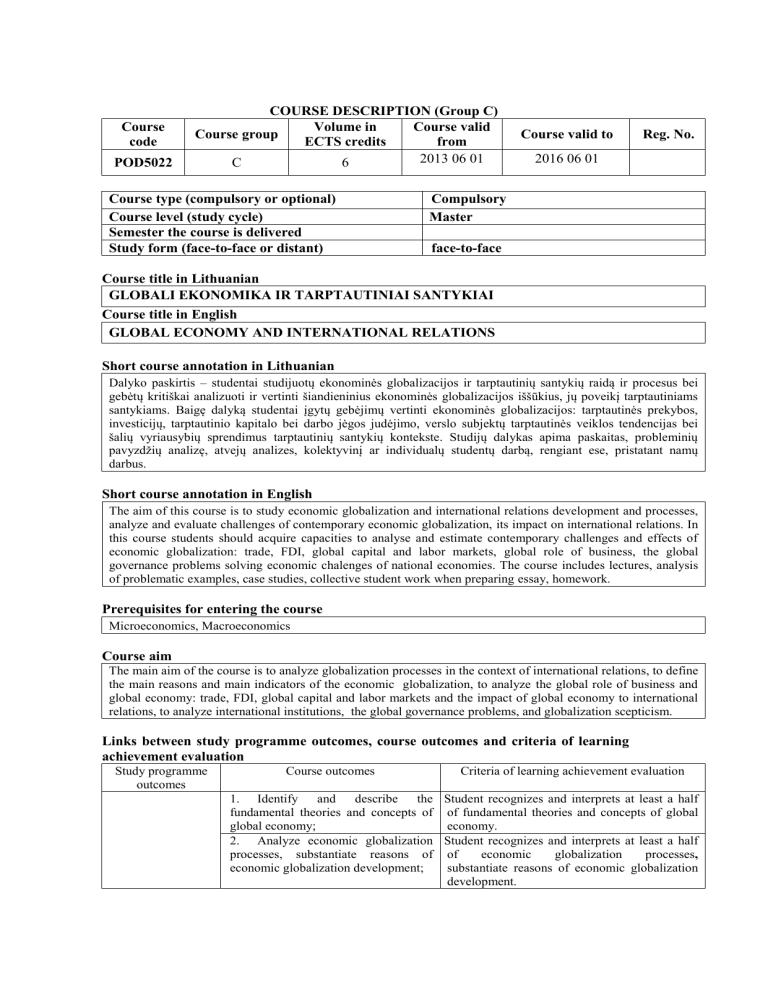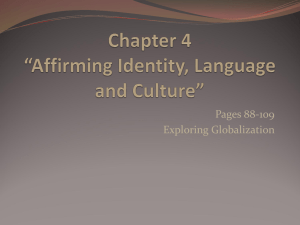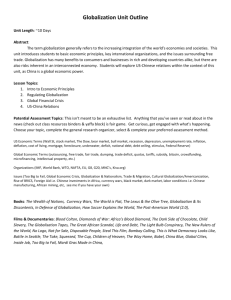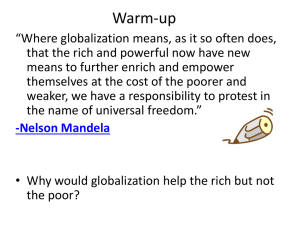Global Economy and International Relations
advertisement

Course code POD5022 COURSE DESCRIPTION (Group C) Volume in Course valid Course group ECTS credits from 2013 06 01 C 6 Course type (compulsory or optional) Course level (study cycle) Semester the course is delivered Study form (face-to-face or distant) Course valid to Reg. No. 2016 06 01 Compulsory Master face-to-face Course title in Lithuanian GLOBALI EKONOMIKA IR TARPTAUTINIAI SANTYKIAI Course title in English GLOBAL ECONOMY AND INTERNATIONAL RELATIONS Short course annotation in Lithuanian Dalyko paskirtis – studentai studijuotų ekonominės globalizacijos ir tarptautinių santykių raidą ir procesus bei gebėtų kritiškai analizuoti ir vertinti šiandieninius ekonominės globalizacijos iššūkius, jų poveikį tarptautiniams santykiams. Baigę dalyką studentai įgytų gebėjimų vertinti ekonominės globalizacijos: tarptautinės prekybos, investicijų, tarptautinio kapitalo bei darbo jėgos judėjimo, verslo subjektų tarptautinės veiklos tendencijas bei šalių vyriausybių sprendimus tarptautinių santykių kontekste. Studijų dalykas apima paskaitas, probleminių pavyzdžių analizę, atvejų analizes, kolektyvinį ar individualų studentų darbą, rengiant ese, pristatant namų darbus. Short course annotation in English The aim of this course is to study economic globalization and international relations development and processes, analyze and evaluate challenges of contemporary economic globalization, its impact on international relations. In this course students should acquire capacities to analyse and estimate contemporary challenges and effects of economic globalization: trade, FDI, global capital and labor markets, global role of business, the global governance problems solving economic chalenges of national economies. The course includes lectures, analysis of problematic examples, case studies, collective student work when preparing essay, homework. Prerequisites for entering the course Microeconomics, Macroeconomics Course aim The main aim of the course is to analyze globalization processes in the context of international relations, to define the main reasons and main indicators of the economic globalization, to analyze the global role of business and global economy: trade, FDI, global capital and labor markets and the impact of global economy to international relations, to analyze international institutions, the global governance problems, and globalization scepticism. Links between study programme outcomes, course outcomes and criteria of learning achievement evaluation Study programme outcomes Course outcomes Criteria of learning achievement evaluation 1. Identify and describe the Student recognizes and interprets at least a half fundamental theories and concepts of of fundamental theories and concepts of global global economy; economy. 2. Analyze economic globalization Student recognizes and interprets at least a half processes, substantiate reasons of of economic globalization processes, economic globalization development; substantiate reasons of economic globalization development. 3. Analyze global economy aspects: Student recognizes and interprets at least a half trade, FDI, global capital and labour of global economy aspects: trade, FDI, global markets, monetary and currency capital and labour markets, monetary and relations, etc.; currency relations and unions, economic policy decisions, taking into account contemporary political, economic and business environment trends 4. Define main motives and means Student recognizes and interprets at least a half of companies’ activities in foreign of the means and motives of international markets and their impact on companies in foreign markets, taking into international relations among countries account contemporary political, economic and and governments; business trends 5. Evaluate the impact of economic Student formulates basic arguments on the globalization on contemporary impact of economic globalization on international relations, especially contemporary International economic relations; economic relations; understand the is able to give reasons for globalization reasons of globalization scepticism; scepticism or optimism, taking into account contemporary political, economic and business trends. 6. Formulate and defend personal Student is able to formulate his opinions and opinion during lectures, presenting the answer simple questions regarding analyzed results of analysis (homework) made, topic; takes responsibility for personal results and justifying personal ideas. writing essay, preparing homework, which satisfy at least half of the requirements Link between course outcomes and content Course outcomes 1. Identify and describe the fundamental theories and concepts of global economy; Content (topics) 1. Theoretical approaches to the globalization and global economy concepts. 2. Analyze economic globalization processes, substantiate reasons of economic globalization development; 3. Analyze global economy aspects: trade, FDI, global capital and labour markets, monetary and currency relations, etc. 2. Factors of the appearance of international relations, necessity and importance of international economic relations. 3. Globalization processes and global economy: 3.a. International trade and foreign investment theories development and international trade and investment flows analysis. 3.b. Global finance area formation and International currency system functioning. 3.c. Global capital and labor market formation and functioning: restructuring of production system. 4. The global role of business. 4.a. Internationalisation processes at firms and markets. 4. Define main motives and means of companies’ activities in foreign markets and their impact on international relations among countries and governments. 5. Evaluate the impact of economic globalization on contemporary International Relations, especially economic relations; understand the reasons of globalization scepticism. 6. Formulate and defend personal opinion during lectures, presenting the results of analysis (homework) made, and justifying personal ideas. 5. Global governance problems: International economic institutions and organizations. 6. Globalization scepticism 1-6 topics. Study (teaching and learning) methods Methods of teaching: The provision of information (interpretation), using visual material (examples for illustration), cases (its interpretation during lectures (lecture-based CASES)); problematic situations, and examples. Formulation of questions and practical tasks; interpretation and moderation of discussion, counselling. Methods of studying: discussion, analysis of examples of problematic issues; consulting, analysis of written and / or video examples and cases; group discussion and a discussion in groups when preparing students' collective homework; individual student work: collection, search and analysis of information, educational literature, and other periodical sources, statistical documents and so on. Methods of learning achievement assessment Testing and essay, evaluation of students’ work (personal or in groups) and final homework preparation. Distribution of student’s workload (contact and independent work hours) Lecture – 45 h Workshops and consultations – 15 h Self-dependent student‘s work (destined to prepare for classes, case studies, effect literature analysis, homework, prepare for mid-term and exam) – 100 h Structure of cumulative score and value of its constituent parts Midterm exam – 20% Homework (report of personal work (or work in groups) in the classroom on chosen topic) – 30% Final exam – 50% Recommended reference materials No. Publication year 1. 2009 2. 2011 3. 2010 4. 2008 5. 2008 6. 2012 Authors of publication and title Publishing house Basic materials Boston (Mass.) Krugman, P. R., Obstfeld, M. [etc.] : International Economics: theory Pearson/Addiso and policy. 8th Edition. n-Wesley Ravenhill, J., Global political Oxford economy University Press Pilinkienė, V. Tarptautinių Kaunas, ekonominių santykių pagrindai. Technologija Mokomoji knyga. Supplementary materials Cohn T.H., Global political Pearson economy : theory and practice 4th Education Edition. International business development: globalization, opportunities, chalenges: International Scientific Vilnius, TEV Conference, 15-16 of may 2008, Vilnius, Lithuania: collection of articles Goldstein J. S., Pevehouse J.C., Boston (Mass.) International relations. 10th [etc.] : Longman Edition Number of copies in SelfUniversity Other study library libraries rooms 3 1 3 2 4 2 1 Course programme designed by Prof. dr. Violeta Pukeliene, Department of Economics, Faculty of Economics and Management Lect. Vitalija Kardokaitė, Department of Economics, Faculty of Economics and Management 1 9 1 1 1








